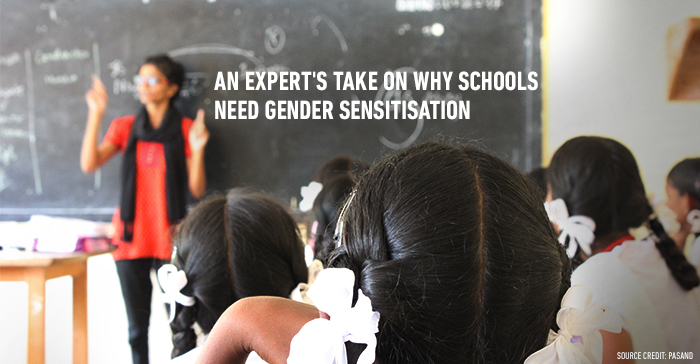How Bangalore is tackling gender bias, one school at a time

“Girls shouldn’t wear short skirts and boys shouldn’t be weak.”
What do you think is wrong with this statement? Or do you think there is nothing wrong at all?
We have come to a stage where two year old girls are being raped and more than 42% girls are abused before they turn 19.* It’s not only girls who are facing these unfortunate and horrific cases; one in two boys in India is a victim of sexual abuse.* We are clearly failing to protect our children, to educate them about how to stay safe. Moreover, it should not be the responsibility of victims to prevent abuse, but rather of the communities to stop it from happening. Many schools have realised this problem, and to help combat it, they have introduced gender sensitization workshops with the help of different organizations that help bring awareness of body safety rules and abuse in age appropriate levels.
We spoke to Sharmada Shastry who works for one such social enterprise based in Bangalore, Pasand, and conducts regular workshops for schools, and here’s what she shared with us:
Why do you think Gender Sensitisation is important?
We aren’t told about some very important things from a young age. For example: your mother would tell you not to go out or you will get raped, but she will never tell you what rape really is. Parents will ask where their daughters are going but not think to question their sons. This leads to many children not understanding the gravity of something like abuse, or rape. Children are curious and if they are shamed by adults for their questions, they look it up on the internet, making them even more vulnerable. It’s important for someone with proper knowledge and an approachable attitude to inform children about their rights, body changes, and how to stay safe. This is where Gender Sensitization workshops step in to help.
What reactions do you usually get from the children?
Reactions vary from school to school, especially depending on the socio-economic background of the children. At first, the children giggle, and are shy or uncomfortable. However, once we get into the session their curiosity takes over any shyness. They ask many questions and understand that it is a serious topic for their own benefit. No one has ever spoken to them about sex or anything related to it before, whatever they know is usually from the media or internet. When children learn that their body changes are normal and natural, but that everybody is different, their reaction is a big sigh of relief and a smile.
Since it’s a sensitive topic how do you make children feel more comfortable?
To make them feel comfortable we use ice-breakers, as well as personal stories and humour from the facilitators. In one ice-breaker we integrate gender norms and ask children to pick a classmate with “good qualities.” You will be surprised that girls choose other girls who are shy or fair and don’t speak much, whereas the boys are picked because they are strong and intelligent. It’s easy to see how harmful gender biases start from a young age.
How do you approach schools and what feedback do you get from them?
Sometimes schools approach us and sometimes we go to them. We start by explaining the need for the programme given the rate of abuse as well as the fear and shame students experience going through puberty. For example 90-95% of our female students do not have much knowledge about their private parts.
60% of our male students do not know boys can be victims of sexual abuse. When we share our own research, schools understand that it’s important to empower kids to make choices for their own health and safety. Most schools agree but some ask us to change or omit some information. Sometimes we oblige, but most of the time we take them through the curriculum, with detailed examples of what happens when certain things are left out, and explain why it’s important. In spite of disagreements on what can be taught and what cannot, we always receive good feedback. More and more schools have started taking up the programme including government schools.
What is the kind of feedback you have received from parents and students?
We have seen a great response from students. We also conduct a pre and post survey to track how much they have learnt. Apart from thanking us, they tell us that they have found more clarity on a particular topic. Just to give you an example: When we start off, girls don’t know much about menstruation so once we tell them about the different taboos and give them information, they understand that it is not shameful but a normal process of their body. With the boys we tell them how much pain their mother went through while giving birth, this in-turn leads them to respect women and see them as equals. One of our 8th standard boys, Praveen told us that “the programme taught [him] that both boys and girls should get education and both should work, before and after marriage.” We use games and activities to get students to make their own conclusions and discoveries including the fact that gender equality is good for both men and women. Making a change in attitudes and information is the first step towards behaviour change.
Reactions from parents is more of a mixed bag. Recently, a mother came up to me and told me that we had gone too much in detail about rape by giving students the legal definition. We explained to her that we cannot teach about rape to the older students without giving an accurate (and legal) definition. This isn’t done to scare students but rather to empower them with their legal rights. Most topics on sexual health and assault awareness are inter-related, and our program makes sure to build slowly to more intense topics. After talking with the parents we often realize they themselves are lacking critical information. Engaging parents (esp. mothers) more effectively is part of the latest program we are piloting in two communities in Bangalore.
Gender Sensitization is a small but necessary step to the gradual eradication of gender biases and to reduce the abuse and harassment across the country (while increasing reporting). Through collective efforts of people, organizations, and with the cooperation of schools and parents, we can hope to keep our children safe by keeping them informed.
What are your views on the same? Write to us at jaagorein@gmail.com or tweet to us at JaagoRe.
Power of 49 Manifesto
The Power of 49 Manifesto points out the need for gender sensitization to be made compulsory for boys and girls from Std. V to XII in order to counter eve-teasing. But there are a many objections for implementing the same. Comment with your views below.
Push the pin
Push the pin on gender issues that you think affect issues related to gender sensitization.
Sources:
UNICEF
The New Indian Express
More about the Experts:
Share this story on






